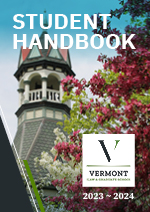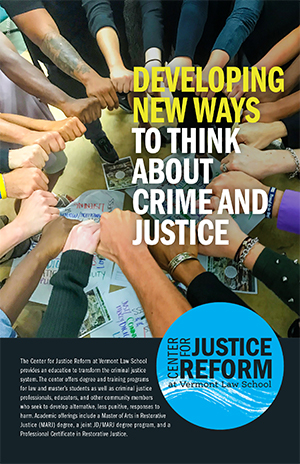Restorative Justice classes offered by the Center for Justice Reform:
Restorative Justice Courses
7325/Advanced Restorative Practices
The Advanced Restorative Practices course teaches students how to design, prepare for, and facilitate a variety of restorative practices. Students will learn from restorative justice experts and then design and lead simulated restorative practices on their own. Students will be graded on a High Pass, Pass, Low Pass, Fail basis. The Principles of Restorative Justice or Origins, Evolution and Critical Issues course (described above) is a prerequisite for this course.
7360/Advanced Victim Rights Seminar
This course builds upon the foundation of Adversity, Trauma and Victimization to explore deeply the legal interplay between victim rights and the criminal justice system. Students will engage in detailed analysis of victim rights law and their juxtaposition with constitutional and other protections for criminal defendants. Students will contemplate fair statutory structures to ensure appropriate and inclusive victim input into justice systems and will develop a detai8led proposal for establishing, safeguarding or expanding victim rights. Prerequisites: RSJ7210 or
7210/Adversity, Trauma and Victimization
This course will explore the legal, historical, cultural, and psychological frameworks underlying victim rights law, as well as best practices for effective victim/survivor engagement across the American criminal justice system.
7140/Applied Criminal Justice
This course will explore the use of criminal legal systems to address social and environmental harms. Following an introductory section covering the basics of criminal law and procedure, the course will explore conventional and alternative criminal justice applications to address crimes against people including drug and internet offenses, animal abuse, and environmental harms. The course will also explore new arenas in which criminal law might be used to advance social justice.
7270/Clemency, Pardon, and Expungement
This course will examine clemency in full beginning with its historical development and interpretation by the U.S. Supreme Court. The class will analyze all facets of clemency: pardons, commutations, fines and forfeitures, reprieves, and amnesty, and engage in discussions about the applicability of clemency today. The discussions will also compare and contrast the broad federal pardon power with the more limited pardon power given to the Governor in Vermont’s Constitution.
5122/Communications, Advocacy and Leadership
Designed to provide students with the knowledge and skills to operate effectively in a variety of careers. Topics include communications to achieve public policy aims; development and implementation of legislative and policy campaigns; and management of enterprises. Offered as both ENV and RSJ.
7290/Drug Policy Reform
This seminar looks at the history and evolution of drug laws in this country, the science and physiology of substance use disorders, and the historical, contemporary, and anticipated new directions in drug policy. Students will be evaluated on their class engagement, submission of a final paper, and a presentation.
7350/Ethics and Restorative Justice
This course provides a brief review of ethical codes of conduct applicable in various professional disciplines and analyzes the possible tension between modern codes of conduct and a pure restorative approach to harm and conflict. Students will be presented with a series of ethical dilemmas by guest practitioners across various disciplines and will be asked to analyze the ethical issues in each problem. The course will draw upon philosophical underpinnings and will analyze and explore how to discern a proper path in complex ethical situations.
7250/Global Restorative Justice: Restorative Practices Around the Globe
This course will consider how other places and countries have adopted and utilized restorative practices to address systemic harm. The location or locations that form the basis of the semester will depend on the expertise of the professor. The initial time this course will be offered it will focus on “Recent Advances in Rwanda.”
7333/Juvenile Justice and Law
This course will explore the historical and current administration of juvenile justice in the US, including the legal and policy justifications for having a separate system for young offenders, and whether this division continues to make sense today. This course will also explore contemporary alternatives to the more traditional juvenile justice responses to include the use of restorative practices.
7215/Narrative Writing Seminar
Today, being an advocate requires more than knowing how to write a brief. Fluency in a variety of written forms – memorandums, op-eds, letters, emails, blog posts – is all but required. This course will cover these forms and others. Students will be graded on regular written assignments and a final paper.
7320/New Approaches to Domestic and Sexual Violence
This course will address how we respond to domestic and sexual violence, the shortcomings to our current approach, and explore meaningful alternatives to our current responses. The course will consider the political, cultural, and legal factors that are influencing shifting attitudes toward crimes of interpersonal violence.
7120/Origins, Evolution, and Critical Issues in Restorative Justice
This course covers the evolving definitions and history of restorative justice and related regulatory and relational practices and approaches. Faculty and students will consider the ways concepts and debates in restorative justice are evolving and being used to tackle some of society’s most challenging problems.
7270/Peacemaking Courts
This course introduction begins with the exploration of the roots of peacemaking from indigenous nations within our national border. Students will learn about differing world views, tribal justice systems (through Native voices), and tensions between Native justice systems and western model court systems. In addition, students will learn about current efforts to nurture communication, collaboration and common ground between the two.
7380/Pleas, Sentencing and Accountability
This course will combine a statutory, rule, and case-law based exploration of plea bargaining and sentencing law and procedure with an experiential component interviewing and writing background biographical reports about criminal defendants in actual Vermont cases. These reports will augment the Pre-Sentence Investigative Reports (PSI) prepared in major felonies and, in other cases without a PSI, assist judges, community justice centers, and parole boards in understanding the “whole person” upon whom consequences are pending.
7355/Police Use of Force
This three-credit seminar explores the constitutional and other implications of police use of force. Students will learn about police training and consider the application of that training in the context of instances of alleged excessive force. Students will write a graded paper and present at the end of the semester.
7115/Principles of Restorative Justice
This highly participatory course will explore restorative justice and the ideas that form its foundation, question its strengths and shortcomings, examine restorative practices, and investigate opportunities to put the theory into practice.
7340/Race, Crimes, and Restorative Justice
This course explores the impact of race on the criminal justice system and how restorative justice approaches might help address the systemic racism that permeates the system. Starting with the US Constitution, the course will explore the 13th Amendment, convict leasing, Jim Crow, and the War on Drugs, mass incarceration, and racial disparities in arrest, prosecution, and sentencing practices.
7330/Restorative Justice in Educational Institutions
This course explores how restorative justice approaches can provide important alternatives to more traditional responses to harm within educational settings. Restorative justice has three primary applications in school settings, which includes both K-12 schools and higher education. Restorative circles are commonly used to build and strengthen relationships between students and with their teachers. Restorative practices help develop “social-emotional learning.” Restorative conferences are used in response to conflict and misconduct.
7230/Restorative Justice in Indigenous Communities
This course will focus on how indigenous people from many countries and cultures respond to conflict and harm. The course will consider how contemporary restorative practices find roots in the approaches from indigenous people.
7365/Teaching Restorative Justice
This three-credit course considers how restorative justice can be taught in a way that is in alignment with restorative values while preparing students to share restorative justice with others through effective teaching and training. Students will learn experientially through teaching a course on restorative justice.
Youth Justice Reimagined
This three-credit course considers the shortfalls of current juvenile justice approaches and invites students to explore an alternative set of overarching juvenile justice goals, endeavoring to better serve the needs of youth, their families, and their broader communities and consider what practical strategies accomplish these goals.


















